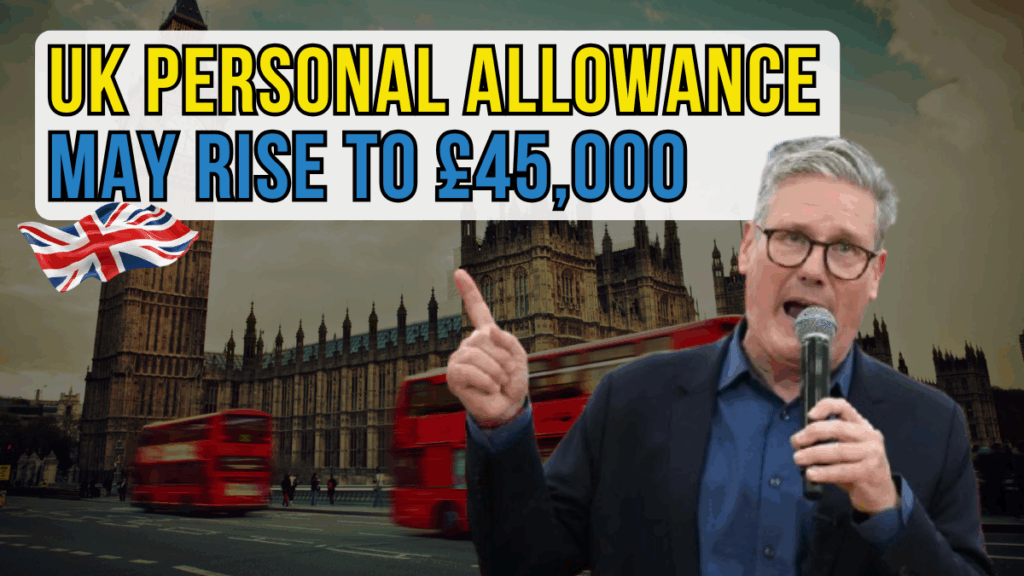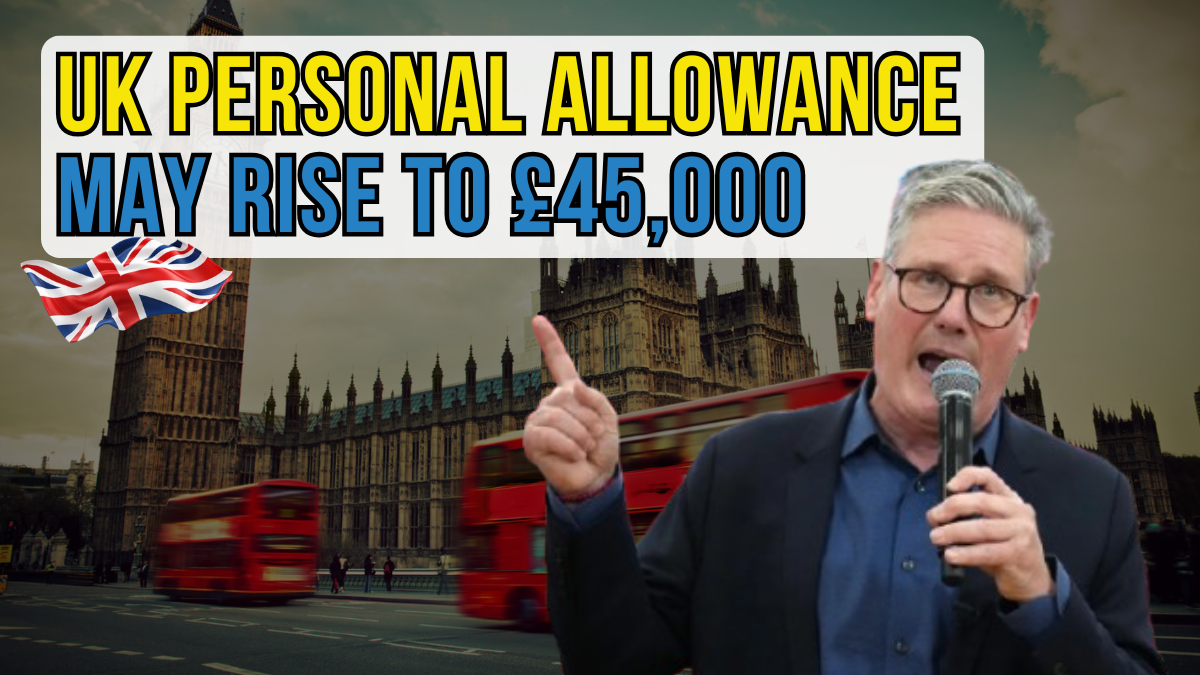A groundbreaking proposal to raise the UK’s Personal Allowance to £45,000 is drawing national attention. If implemented, this reform would dramatically alter the income tax system, potentially removing millions of low and middle-income earners from paying any income tax at all.

While this idea has yet to be adopted as law, the discussions around it are gaining traction, with supporters claiming it could relieve financial pressures, stimulate economic growth, and simplify the tax system.
Summary Table: Proposed Personal Allowance Changes
Aspect |
Details |
|---|---|
Current Personal Allowance |
£12,570 (frozen since 2021) |
Proposed Personal Allowance |
£45,000 |
Who Benefits |
UK taxpayers earning up to £100,000 |
Potential Tax Saving (at £45k income) |
£6,486 annually |
Government Position |
Not yet official policy |
Official Site |
What Is the Personal Allowance?
The Personal Allowance is the amount of income an individual can earn in the UK each year without paying income tax. It currently stands at £12,570 for the 2025/26 tax year, a figure that has remained unchanged since 2021.
Once a person earns above this threshold, income tax is charged in bands, increasing with income:
- £0 – £12,570: 0% tax
- £12,571 – £50,270: 20% (Basic Rate)
- £50,271 – £125,140: 40% (Higher Rate)
- Over £125,140: 45% (Additional Rate)
Additionally, individuals earning over £100,000 begin to lose their Personal Allowance, which reduces by £1 for every £2 earned above the limit. This means that no Personal Allowance is available for those earning over £125,140.
Note: Scotland operates a slightly different income tax structure with separate bands.
What Is Being Proposed?
The proposal suggests increasing the Personal Allowance to £45,000, which would mean no income tax would be paid on the first £45,000 of an individual’s earnings.
This change could transform the tax obligations for:
- Lower-income earners (who may pay no income tax at all)
- Middle-income earners (who could see their tax bills slashed)
- High-income earners (who would still pay less on the first £45k)
Why Raise the Personal Allowance?
The motivation for raising the threshold stems from multiple economic and social factors, including:
1. Rising Cost of Living
UK households face mounting expenses due to:
- Inflation in essentials like housing, food, and energy
- Stagnant wage growth, which has eroded real incomes
2. Support for Working Families
Proponents argue the change would reduce the tax burden on:
- Families on modest incomes
- Individuals with one or more jobs trying to make ends meet
3. Tax Fairness
Supporters say it would address long-standing inequalities by allowing more disposable income for those who need it most.
4. Economic Growth
More money in workers’ pockets could:
- Boost consumer spending
- Stimulate local businesses
- Increase economic activity across sectors
Who Benefits Most?
The policy could deliver substantial savings for a broad range of income groups. Below is an estimate of how much income tax could be saved annually:
Annual Income |
Tax Saved (Est.) |
New Effective Tax Rate |
|---|---|---|
£15,000 |
£486 |
Near zero |
£25,000 |
£2,486 |
Minimal |
£35,000 |
£4,486 |
Strong middle-income relief |
£45,000 |
£6,486 |
No income tax |
£55,000 |
£6,486 |
Tax starts at £45,000 threshold |
£100,000 |
£16,000+ |
Partial benefit |
Even high-income earners would see their first £45,000 of earnings become tax-free, leading to significant net savings.
What Could Be the Economic Impact?
Potential Benefits
- Increased Spending: More cash in hand could boost retail and services.
- Reduced Welfare Demand: With more disposable income, fewer people may need state benefits.
- Job Creation: Economic stimulation could lead to new business growth and employment opportunities.
- Administrative Efficiency: Removing millions from the income tax system could streamline HMRC operations.
Possible Concerns
- Revenue Shortfall: Income tax is a major source of public funding. The government could lose tens of billions in tax revenue.
- Compensatory Measures: To offset the loss, the Treasury might need to:
- Increase VAT or Corporation Tax
- Cut public spending
- Borrow more, increasing the national debt
- Inflation Risks: An increase in consumer demand could push up prices.
Is It Government Policy Yet?
As of now, the idea to raise the Personal Allowance to £45,000 is not part of official government policy. It has been proposed by certain political figures and economic think tanks, but the Chancellor and HM Treasury have not committed to enacting it.
Any such reform would likely be subject to:
- A formal fiscal review
- Parliamentary approval
- Alignment with broader tax reform objectives
FAQs: Personal Allowance and the £45,000 Proposal
Q1: Will I pay any income tax if my earnings are under £45,000?
A: Under the proposed change, no. All income up to £45,000 would be tax-free.
Q2: Does this benefit pensioners?
A: Yes. Pensioners earning below £45,000 would also be exempt from income tax under this proposal.
Q3: Is this change officially confirmed?
A: No, the UK government has not adopted this proposal. It remains under discussion.
Q4: What about people earning over £100,000?
A: High earners would still benefit from a tax-free allowance on their first £45,000, though other tax rules (such as tapering) may apply.
Q5: Could the change lead to higher taxes elsewhere?
A: Possibly. The government may need to adjust other taxes or cut spending to offset lost revenue.
Conclusion: A Game-Changing Proposal with Far-Reaching Impact
Raising the UK Personal Allowance to £45,000 would be a revolutionary tax reform with immediate benefits for millions. While the idea is still under consideration, the potential for reducing inequality, stimulating the economy, and easing the cost-of-living burden makes it a focal point of ongoing political debate.
Whether or not the proposal becomes law, it has already sparked critical conversations about the future of taxation in the UK.
Official Income Tax Information Portal:
https://www.gov.uk/income-tax-rates
Click HERE for Information
